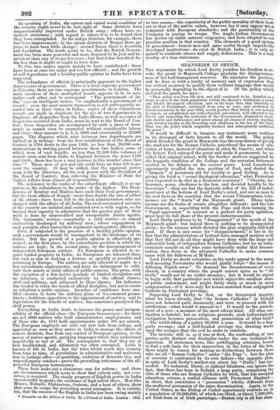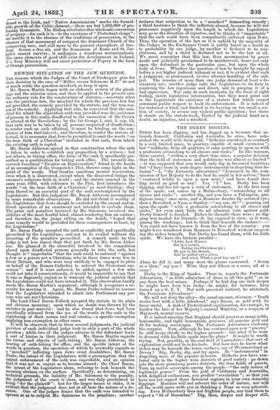ORANGEISM IN OFFICE.
THE arguments by which Lord Derby justifies his freedom to re- voke the grant to Maynooth College proclaim the disingenuous. ness of his half-transparent reserves. He misstates the position, and he does so with a laxity of memory and of expression that tax critical accuracy to qualify them without language that would be personally degrading to the object of it. Of the policy which dictated the grant, he says- " That policy was from the first, and still continued to be, founded on a desire to give to the Irish population within the Queen's dominions a sound and liberal theological education, and on the hope that that liberality on the part of Parliament, continued from year to year, and confirmed by formal enactment in the year 1845, would produce that which it was natural to expect, an enlightened and well-educated priesthood, well-affected to the Crown and respecting the authority of the Government, disposed to incul- cate charity and forbearance and peace among all classes of society, together with devoted loyalty to the Sovereign and obedience to the law of the land. That was the policy which originally dictated and subsequently confirmed the grant."
It would be difficult to imagine any statement more reckless in its disregard of facts known to all the world. The policy which dictated the grant to Maynooth was the expediency of giving the students for the Roman Catholic priesthood the means of edu- cation at home, instead of education in alien St. Omer's ; and when Sir Robert Peel enlarged the grant and made it permanent, he re- called that original intent, with the further motives suggested by the beggarly condition of the College and the sectarian bitterness excited in the debates on the annual grant. Lord Lansdowne opportunely recalled the true position of Peel, and denied the " bargain" of pecuniary aid for loyalty or good feeling. As to giving the Irish a " sound theological education," what Protestant ever expected to do that in, a Romanist seminary P " Charity, for- bearance, peace, obedience to the law, and devoted loyalty to the Sovereign "—they are but the fantastic reflex of the bill of indict. ment now at the bottom of Lord Derby's mind, and are as near to the real facts as the assertion that the recent Ultramontane vehe- mences are the " fruits" of the Maynooth grant. Those inde. mums are the fruits of events altogether different; and the late Government, in coquetting with the Pope and then turning the " Papal aggression" to account as a pretext for party agitation, must bear its full share of the present embarrassments. Lord Derby professes to be " disappointed " at the result of the Maynooth grant: but indeed there is nothing to be disappointed about; for the reasons which dictated the plan originally still hold good. If there is any cause for " disappointment," it lies in the fact that the administrators of Ireland have managed matters so ill that they did not do all they might have done with the large and influential body of independent Roman Catholics ; but by an indis- criminate assault on all who came technically under that denomi- nation, they drove in the advanced Catholics to make common cause with the followers of Maale.
Lord Derby no doubt calculates on his ready appeal to the many well-meaning Protestants who would gladly refuse " the means of diffusing Popish error." To demand the disendowment of every i church, in a country where the people cannot agree as to "the truth," would not be an unfair measure ; but it would be unjust to begin with that particular sect which enjoys the smallest share of public endowment, and might fairly claim so much in mere compensation—if it were only for horses snatched from subjugated Catholic by Protestant privilege. Supposing Lord Derby to find, on the threatened inquiry, what we know already, that "the Roman Catholics" in Ireland have not behaved quite decorously, and were to proceed with his retribution—what would it amount to ? It would be the punish- ment of a sect—a measure of the most odious kind. All class cas- tigation is hateful; but on religious grounds, such indiscriminate castigation becomes persecution, and persecution of what kind? —The withholding of a paltry 26,0001. a year. It would be a beg- garly revenge ; and a dull-headed revenge too, drawing worse upon the avenger than the evil he seeks to retaliate.
The mistake still is, as it was at first, the confounding of two parties quite distinct and dissimilar under the one technical de- signation. If statesmen were, like pettifogging attornies, bound to find a safe basis for their manceuvres in the letter of the law, there might be reason for making no distinctions between those who are all " Roman Catholics " under " the Pope "; but the plan of coercion is condemned by its own failure—the opposite plan, in spite of Lord Derby's market-cry about his " fruits," has suc- ceeded. No technical, literal, or judicial blindness, can ignore the fact, that there has been in Ireland a large party, comprising the elite of those who are Roman Catholics by birth, that has accepted education, science, a cordial alliance with Protestant England—. In short, that constitutes a " persuasion " wholly different from the media3val persuasion of the same denomination. Again, in the United States, as the Bishop of Cashel opportunely reminds us, in a population of 23,000,000, of which one-third, or about 7,500,000, are Irish-born or of Irish parentage,—Boston city is all but alien- doped to the Irish, and" Native Americanism" marks the formid- able growth of the Celtic element,—there are but 1,663,000 of pro- fessing Romanists. The Bishop attributes this wholesale conversion of progeny—for such it is—to the exertions of " Protestant clergy": we ascribe it to the absence of the traditions of persecution, to the absence of that monument of conquest the dominant Church of the conquering race, and still more to the general atmosphere of free- dom. Secure a free air, and the Romanism of Rome and St. Jar- lath's cannot survive ; it undergoes a wondrous metamorphosis. The same elements of od still exist for development in Ireland,
if a Tory Ministry not enact protection of Popery in the form of Orange persecution.



























 Previous page
Previous page